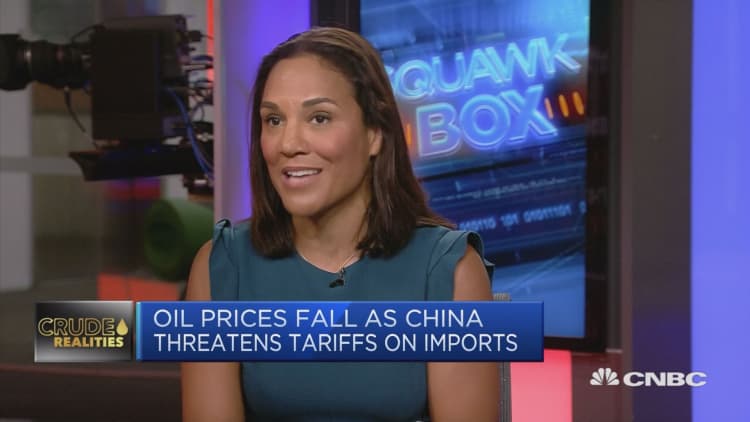Oil prices rose on Monday in volatile trade as this week's OPEC meeting raised the specter of production increases and as investors assessed the impact of a trade dispute between the United States and China.
U.S. West Texas Intermediate (WTI) crude ended Monday's session up 79 cents, or 1.2 percent, to $65.85, after earlier touching a two-month low at $63.59 per barrel. Brent crude futures rose $1.88, or 2.6 percent, to $75.32 per barrel by 2:29 p.m. ET.
U.S. crude's discount to Brent widened to as much as $9.73 a barrel, after narrowing Friday. China's trade restrictions could leave the growing volumes of U.S. crude from shale without a buyer, traders said. While the volumes would ultimately get shipped elsewhere, absent China the price could be depressed, traders said.
Brent hit a 3½-year high above $80 a barrel in May but has since eased back on reports that top suppliers Saudi Arabia and Russia will increase production.

"Volatility is going to be pretty high this week," said Bob Yawger, director of energy futures at Mizuho in New York. Indications from OPEC members and other large producers on the scale of potential production increases are likely to drive the market, he said.
The Organization of the Petroleum Exporting Countries (OPEC) and allied oil producers including Russia meet on June 22 in Vienna. Russia and OPEC kingpin Saudi Arabia are pushing for higher output.
"Oil prices are reversing this morning's bout of weakness as bottom pickers enter the fray ahead of this weeks crucial OPEC/non-OPEC meeting," said Stephen Brennock, analyst at London brokerage PVM Oil Associates.
Over the weekend, Russian Energy Minister Alexander Novak indicated the countries, which have cut production, would now consider increasing output 1.5 million barrels per day (bpd) in the third quarter only, the TASS news agency reported.
Yet any output increase agreement could be muted because other OPEC members including Iraq said last week that production cuts should be maintained because prices still need support.

Despite potential downward pressure from large producers increasing output, Goldman Sachs maintained its bullish outlook. The bank said "the oil market remains in deficit ... requiring higher core OPEC and Russia production to avoid a stock-out by year-end."
The bank said it expected OPEC and Russian output to raise 1 million bpd by year-end and another 0.5 million bpd in the first half of 2019.
That is significantly higher than estimates from several other banks.
Societe Generale said it expects Saudi Arabia, the UAE and Kuwait to increase output by a combined 500,000 bpd beginning in July, and Russia to increase by 200,000 bpd within two to three months.
"The focus will be on replacing Venezuelan losses," the bank said.
Adding extra pressure are global trade tensions. U.S. President Donald Trump last week pushed ahead with tariffs on $50 billion of Chinese imports, starting on July 6. China retaliated by imposing import duties on U.S. products, and suggesting that crude oil tariffs were planned.

"It's more of a threat than anything," said Joe McMonigle, senior energy policy analyst at Hedgeye Potomac Research. "They're trying to gain leverage in a soft spot for Trump to use for other concessions later."
Benjamin Lu of brokerage Phillip Futures said Beijing's retaliation had spooked oil investors: "These punitive measures on bilateral trade have unnerved investors as it hurts global economic growth."
U.S. bank Morgan Stanley said in a note to clients that the trade spat meant that economic "downside risks have risen."
U.S. oil exports have boomed in the last two years as shale oil production has surged, with China becoming one of the biggest buyers.
— CNBC's Tom DiChristopher contributed to this report.

